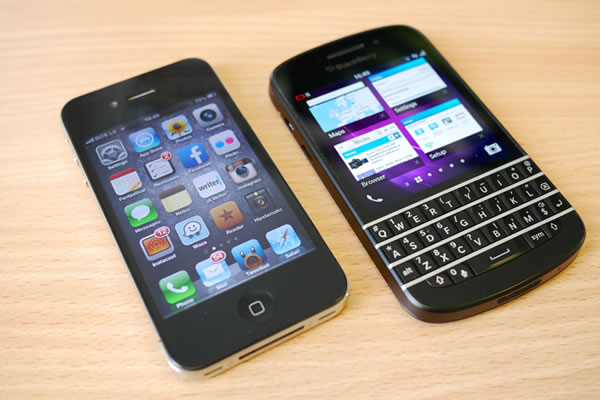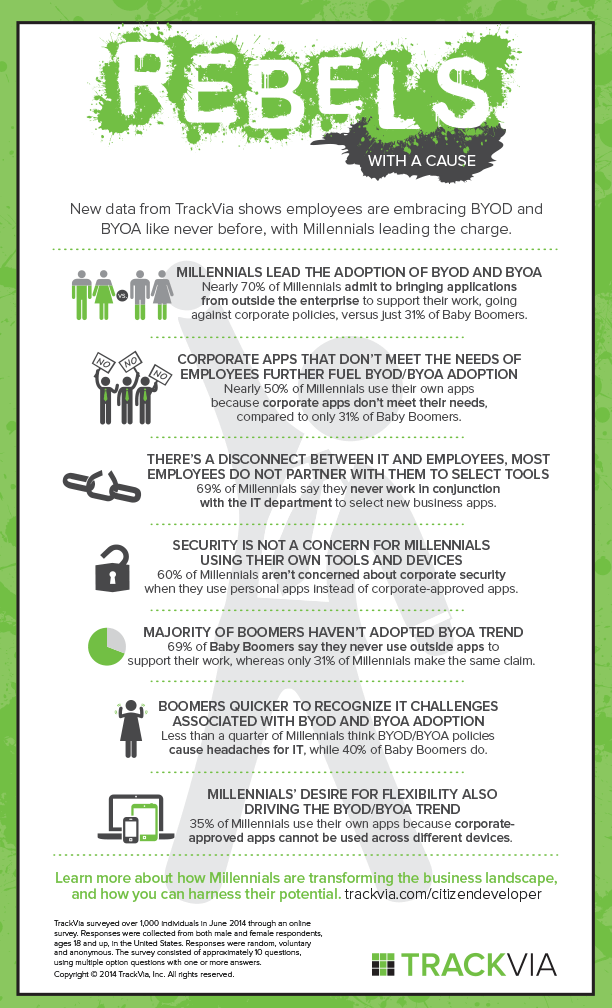Millennials are BYOD’s biggest rulebreakers, but there’s a method to their misdemeanors
Millennials — the generation born between the early 1980s and early 200s — already have a bad enough reputation in the workplace:
It turns out that they’re also the employees who break companies’ BYOD rules most often, and they’re doing it to work more effectively. A survey conducted by Trackvia, a company that makes a platform to let non-programmers create their own mobile business apps, reveals the following observations from 1,000 respondents interviewed in June:
- 60% of the Millennial respondents “aren’t concerned about corporate security when they use personal apps instead of corporate-approved apps” because those apps aren’t up to the job. They’d much rather use apps that they believe are better.
- 69% of the Millennial respondents say they never work in conjunction with IT department when selecting new business apps.35 percent of Millennials use their own apps because corporate-approved apps cannot be used across different devices.
- 35% of the Millennial respondents say they use their own apps because corporate-approved apps can’t be used across different devices.
- While nearly 70% of respondents from the Baby Boomer generation (people born between 1946 and 1964) said they never use “outside” apps to support their work, only 31% of the Millennials said the same. In other words, the percentage of Baby Boomers who didn’t use outside apps is about equal to the percentage of Millennials who did use them.
For more from the survey, see Trackvia’s report, titled Rebels With a Cause, and the infographic below:
Vectra Networks/LinkedIn Information Security Community study: Nearly four-fifths of organizations lack a BYOD policy

In another BYOD study — this one conducted jointly by security platform company Vectra Networks and LinkedIn’s Information Security Communty group — over 1,100 IT professionals were interviewed about BYOD in their workplace. Here are some of the statistics:
- 79% have “not fully implemented” BYOD policies, processes, and infrastructure”.
- 24% did not even have a mobile device policy.
- When it came to protecting company data, respondents were most concerned about these:
- Business data (74%)
- Customer/employee data (69%)
- Documents (66%)
- The most common security measures for mobile devices used at respondents’ companies were:
- Passcode protection (67%)
- Remote wiping of data (52%)
- MDM (43%)
- Encryption (43%)
- Endpoint security tools (39%)
- Network access controls (38%)
For more from the study, see Vectra Networks’ 2014 BYOD and Mobile Security Report.
Mobile is the new desktop
With just about as many mobile subscriptions as there are people worldwide, it shouldn’t come as a surprise that people are adopting mobile devices for every aspect of their lives, including work. The problem is that with increased use of mobile devices, especially personal ones, come increased security risks. Many organizations have been slow or resistant in adopting mobile technologies, but as InformationWeek’s Dark Reading blog puts it, “it’s happening, whether IT or security teams believe it or not”.
The infographic below was created by mobile security vendor BlueBox and shows mobile device use at work, and the gap in concerns about mobile that separates employees from IT:
The Apple/IBM partnership may help alleviate enterprise BYOD pain

The unexpected is happening at a “well-known investment firm” in New York City: nearly 60% of them are encountering enough frustration with their BYOD devices that they want to return to two phones — one for personal use, one for work — and are saying “I want my BlackBerry back”. It turns out that the MDM has been draining their devices’ batteries and interfering with their work (one example: one MDM app didn’t let them send email from within a Salesforce app or open a PDF with GoodReader), and their BYOD policies are skewed too heavily in favor of the company’s rights over employees’ privacy.
AppleInsider suggests that the recently-announced enterprise mobility partnership between Apple and IBM may solve these problems, with its promised IBM-developed “device management native to iOS” and a new “end-to-end procurement and lifecycle management services allow employees to manage their own mobile devices” may alleviate these problems. They’re not available yet, and if you’re thinking of adopting a BYOD policy at your organization, you have to consider the trade-offs that exist in the here and now.
Special thanks to Phil Caruso, Director, Channel Programs at GSG, for helping with this article!


